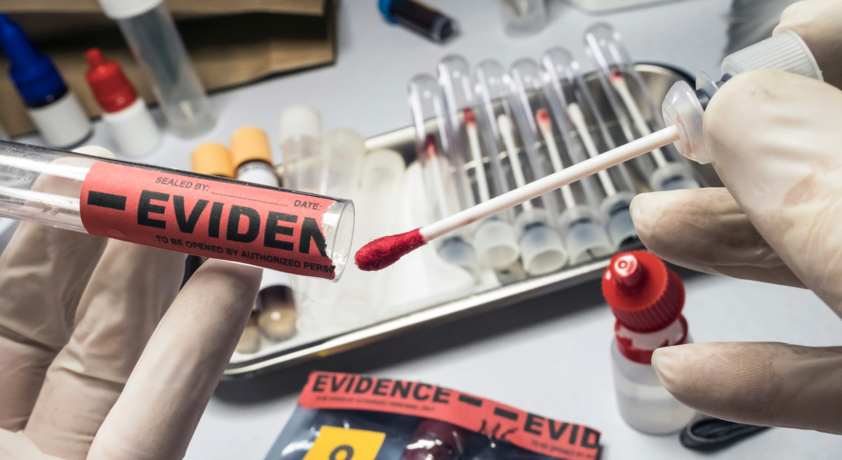Last Updated: 28 May, 2023

Forensic Science Degree
A forensic science degree provides students with a comprehensive understanding of scientific methods and techniques used in criminal investigations. It covers areas such as crime scene analysis, evidence collection and analysis, forensic biology, chemistry, and digital forensics, preparing graduates for rewarding careers in the field of forensic science.
In recent years, there has been a significant rise in the demand for forensic science professionals. As technology continues to advance and crimes grow increasingly intricate, the demand for proficient experts in forensic analysis has surged. Law enforcement agencies, government organizations, and private forensic laboratories actively seek professionals with specialized knowledge in areas such as DNA analysis, toxicology, ballistics, and digital forensics.
What Is a Forensic Science Degree?
A forensic science degree is an academic program that equips students with the knowledge and skills necessary to pursue a career in the field of forensic science. It encompasses the study of various scientific disciplines, such as biology, chemistry, physics, and more, with a specific focus on their application in criminal investigations.
Through coursework, laboratory exercises, and hands-on training, students gain a deep understanding of forensic techniques, evidence collection and analysis, crime scene investigation, and the use of scientific methods in legal proceedings. A forensic science degree prepares graduates for diverse roles in forensic laboratories, law enforcement agencies, government organizations, and research institutions.
Forensic Science Degree Levels
Forensic science degrees are available at different academic levels, providing students with various options to match their career goals and educational aspirations. Each degree level in forensic science offers a unique level of specialization, academic rigor, and career prospects. The following are the common degree levels in forensic science:
Associate’s Degree in Forensic Science
An associate’s degree in forensic science typically requires two years of study and provides students with a foundational understanding of the field. This degree level introduces fundamental concepts and techniques used in forensic investigations, such as crime scene processing, evidence collection, and forensic analysis. While an associate’s degree can qualify individuals for entry-level positions in forensic laboratories or crime scene investigation units, many students choose to pursue further education to expand their career opportunities.
Bachelor’s Degree in Forensic Science
A bachelor’s degree in forensic science is a comprehensive four-year program that delves deeper into the scientific principles and methodologies relevant to forensic investigations. Students explore various disciplines within forensic science, including forensic chemistry, biology, toxicology, and DNA analysis. In addition to the scientific coursework, students often gain practical experience through laboratory work and internships. A bachelor’s degree equips graduates with the knowledge and skills necessary for positions as forensic science technicians, forensic analysts, or research assistants.
Master’s Degree in Forensic Science
A master’s degree in forensic science is a graduate-level program that provides advanced knowledge and specialization in specific areas of forensic science. This degree allows students to focus on a particular subfield, such as forensic toxicology, forensic anthropology, or digital forensics. The curriculum typically includes advanced coursework, research projects, and opportunities for the practical application of forensic techniques. A master’s degree in forensic science can enhance career prospects, particularly for positions in research, leadership, or specialized areas of forensic science.
Doctoral Degree in Forensic Science
A doctoral degree in forensic science is the highest level of academic achievement in the field. This degree level is primarily intended for individuals interested in conducting research, pursuing academic careers, or advancing to leadership positions in forensic science. Doctoral programs involve in-depth research, the development of original contributions to the field, and the completion of a doctoral dissertation. While a doctoral degree is not required for most forensic science careers, it can open doors to opportunities in academia, research institutions, or high-level forensic positions.
Online Forensic Science Degree
Earning an online forensic science degree offers flexibility and convenience for individuals passionate about pursuing a career in this dynamic field. Online programs provide comprehensive coursework and practical training that mirror traditional on-campus programs. With advancements in technology and virtual learning platforms, students can access high-quality education and interact with experienced faculty and peers from the comfort of their own homes.
Advantages of an Online Forensic Science Degree
- Flexible Learning Environment: Online programs allow you to study at your own pace and schedule, providing the flexibility to balance your education with other commitments such as work or family responsibilities.
- Convenience and Accessibility: With an online forensic science degree, you can access course materials and lectures from anywhere, eliminating the need for commuting to a physical campus. This convenience enables individuals from various locations to pursue their education without geographical constraints.
- Diverse Course Offerings: Online programs offer a wide range of forensic science courses, allowing you to explore different specializations and tailor your studies to align with your career goals and interests.
- Interactive Learning Tools: Online platforms often provide interactive learning tools, virtual simulations, and multimedia resources that enhance your understanding of complex forensic science concepts and techniques.
Key Specializations in Forensic Science
Forensic science encompasses a wide range of specializations that focus on different aspects of crime scene investigation, evidence analysis, and forensic techniques. Pursuing a specialization within forensic science allows individuals to develop expertise in specific areas and opens up unique career opportunities. Here are some key specializations in forensic science:
Forensic Biology and DNA Analysis
Forensic biology and DNA analysis involve the examination and identification of biological evidence found at crime scenes, such as blood, saliva, or hair. Specialists in this field analyze DNA samples to establish identity, determine relationships, and provide crucial evidence in criminal investigations. They use advanced laboratory techniques and genetic databases to compare DNA profiles and contribute to solving crimes.
Forensic Chemistry and Toxicology
Forensic chemistry and toxicology focus on the analysis of chemical substances and their effects on the human body. Specialists in this field examine substances such as drugs, poisons, and trace elements found in biological samples or at crime scenes. They use sophisticated instruments and methods to identify and quantify substances, providing critical information to investigators and legal professionals.
Digital Forensics and Cybersecurity
Digital forensics and cybersecurity deal with the investigation of electronic devices and cybercrimes. Specialists in this field recover and analyze digital evidence, such as data from computers, smartphones, or networks, to reconstruct events, track online activities, and uncover digital traces left by criminals. They employ specialized software and techniques to protect digital evidence and maintain the integrity of information.
Forensic Anthropology and Odontology
Forensic anthropology and odontology focus on the identification and analysis of human remains. Specialists in these fields assist in determining the age, sex, ancestry, and cause of death of skeletal remains. Forensic anthropologists apply knowledge of skeletal biology and anthropology to help establish the identity of individuals, while forensic odontologists use dental records and dental features to assist in identification.
Crime Scene Investigation and Reconstruction
Crime scene investigation and reconstruction involve the meticulous collection, documentation, and analysis of physical evidence at crime scenes. Specialists in this field use scientific methods to reconstruct the sequence of events, interpret bloodstain patterns, analyze ballistics, and reconstruct accidents or crimes. They work closely with other forensic experts and law enforcement agencies to ensure accurate crime scene processing and evidence preservation.
Benefits of Pursuing a Forensic Science Degree
Obtaining a forensic science degree offers numerous benefits, providing individuals with versatile and in-demand skills that can be applied to various scientific and investigative fields.
Versatile and In-Demand Skills
Obtaining a forensic science degree offers several benefits, including the development of versatile and in-demand skills. Throughout the program, students acquire a strong foundation in scientific principles and methodologies, critical thinking, problem-solving, and attention to detail. These skills are not only applicable to forensic science but also transferable to various other scientific and investigative fields. The multidisciplinary nature of forensic science education equips graduates with a diverse skill set that can be utilized in different professional settings.
Exciting and Rewarding Career Opportunities
A forensic science degree opens doors to a range of exciting and rewarding career opportunities. Graduates can pursue professions such as forensic scientists, crime scene investigators, forensic analysts, forensic toxicologists, fingerprint examiners, digital forensics specialists, and more. These roles allow individuals to actively contribute to solving crimes, assisting in legal investigations, and making a significant impact on justice and public safety. The field of forensic science offers dynamic and fulfilling career paths with the potential for growth and advancement.
Contribution to Justice and Public Safety
One of the most significant benefits of pursuing a forensic science degree is the opportunity to contribute to justice and public safety. Forensic scientists play a crucial role in analyzing evidence, reconstructing crime scenes, and providing expert testimony in legal proceedings. By applying scientific methods and techniques, they help uncover the truth, support criminal investigations, and ensure the integrity of the justice system. The work of forensic science professionals directly impacts the lives of individuals, communities, and society as a whole, making it a rewarding and meaningful career choice.
Forensic Science Degree Jobs
A forensic science degree opens up a wide range of exciting and rewarding career opportunities in the field of forensic science. Graduates with a forensic science degree possess the knowledge, skills, and expertise necessary to contribute to criminal investigations, analyze evidence, and support the justice system. Here are some key job roles that individuals with a forensic science degree can pursue:
Forensic Scientist
Forensic scientists are at the forefront of analyzing and examining evidence collected from crime scenes. They utilize various scientific techniques and technologies to identify, process, and interpret evidence such as fingerprints, DNA, ballistics, and trace materials. Forensic scientists work closely with law enforcement agencies, providing crucial insights and expert testimony in legal proceedings.
Crime Scene Investigator
Crime scene investigators, also known as forensic technicians or crime scene analysts, play a vital role in processing and documenting crime scenes. They meticulously collect and preserve physical evidence, take photographs, create sketches, and compile detailed reports. Crime scene investigators work alongside law enforcement officers, ensuring that all relevant evidence is properly documented and secured for analysis.
Forensic Toxicologist
Forensic toxicologists specialize in the analysis of biological samples, such as blood, urine, and tissues, to detect and identify drugs, toxins, and chemicals present in the human body. They work closely with medical examiners, law enforcement agencies, and legal professionals to determine the role of toxic substances in crimes, accidents, and deaths. Forensic toxicologists provide expert opinions and testimony in court regarding the effects and implications of toxic substances.
Forensic DNA Analyst
Forensic DNA analysts focus on the analysis and comparison of DNA samples collected from crime scenes, victims, and suspects. Using sophisticated laboratory techniques, they extract, analyze, and interpret DNA profiles to establish links, identify individuals, and provide crucial evidence in criminal investigations. Forensic DNA analysts adhere to strict protocols to ensure the accuracy and reliability of DNA analysis results.
Digital Forensics Specialist
With the rise of technology-related crimes, digital forensics specialists are in high demand. These professionals specialize in the collection, preservation, and analysis of digital evidence from computers, mobile devices, and digital storage media. They employ advanced tools and techniques to recover deleted data, trace online activities, and investigate cybercrimes. Digital forensics specialists assist in uncovering digital evidence relevant to criminal investigations, intellectual property theft, and cybersecurity incidents.
Forensic Ballistics Expert
Forensic ballistics experts analyze firearms, bullets, and cartridge cases to determine their role in crimes. They examine firearms and ammunition, conduct microscopic analysis, and use ballistic imaging technologies to match bullets and casings to specific weapons. Forensic ballistics experts work closely with law enforcement agencies and provide expert testimony in court regarding firearm-related evidence.
Forensic Anthropologist
Forensic anthropologists specialize in the analysis of human skeletal remains to assist in the identification of unknown individuals, determine the cause of death, and provide insights into the circumstances surrounding a crime. They utilize their knowledge of human anatomy and skeletal biology to reconstruct facial features, estimate age and sex, and identify possible signs of trauma or disease.




